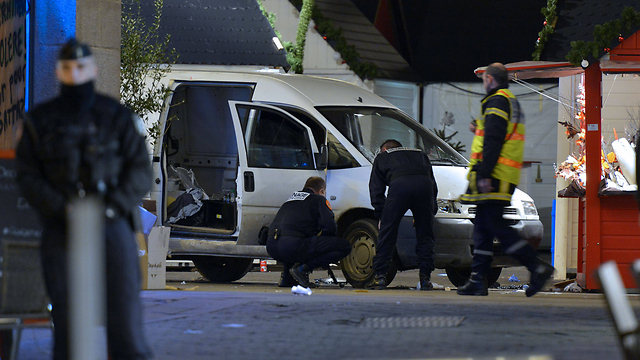PARIS – Terrorists? Lone wolves? Mentally ill? Regardless of the motives, the series of incidents
which have taken place in France over the past week – whether they were terror attacks or acts of insanity – have raised the anxiety level in the country on days which are usually characterized by a different type of pressure: The holiday shopping.
Is that so? It's hard to give a definite answer, but a return to the anti-Semitic attack in Créteil,
which shocked France less than a month ago, provides a peek into the consciousness of those "errant weeds."
The state's leaders are trying to calm the public down, saying that the incidents are unrelated to each other, and that Islamist terror played no part in some of them.
Demographic Transformation
Guy Bechor
Op-ed: The Westernization of the Arab world has been replaced with the Islamization of Europe. The Arab League boycotted Israel from its very first day, and the 'European Union' with its new Muslim masters may now follow in its footsteps.
Jonathan and Marie were the perfect example of the French melting pot. He is 21 years old, secular, the son of a Jewish family. She is 19 years old, from a small town in Normandy. That's as French as you can get.
They met when Jonathan served as a gendarme in Marie's hometown. Not exactly the first profession one would think about for a Young French Jew of North African descent. Ilan Halimi, who was kidnapped and murdered almost nine years ago, worked in cell phone marketing, a more typical occupation for young Jews who did not pursue a higher education or did not get into the family business.
Marie was 17 years old. They have been together since then. Together they decided to leave Normandy, the gendarmerie and her family's home, where they began their life as a couple. In the meantime, they are living with Jonathan's parents in Créteil, a commune in the southeastern suburbs of Paris, which has 80,000 residents. One of five is Jewish.
Jonathan's father visits the synagogue on Fridays. Nonetheless, his secular son's non-Jewish girlfriend was welcomed with open arms. Créteil is proud of its large Jewish community, as well as of the good neighborly relations between members of different religions and descents.
When she heard a knock on the door, Marie did not suspect anything. Jonathan had ordered something on Amazon, and besides, is there anything to be afraid in the middle of the day, in the middle of Créteil?
When Marie opened the door, it was already too late. Two young black men and a third of North African descent demanded the money. Which money? The Jew's money.
"Isn't your father Jewish?" they asked Jonathan, who had rushed in from the other room upon hearing Marie's shouts. "Doesn't he have a black Mercedes? Yes, he does. So bring us the money!"
The three assailants left the apartment more than an hour later, after one of them sexually assaulted Marie and his friends took the jewelry and cash they had managed to get their hands on.
France's interior minister announced in a solidarity rally with the Jewish community that the fight against anti-Semitism was a top national priority, but among the wide public the common response was something along the lines of "if it were not for the attack's anti-Semitic background, it would not have received so much media and political attention."
No one mentioned the fact that in their great ignorance, the three assailants chose two young people who were not really interested in the past, in the identity, in religion or Zionism.
The criminals from Créteil and the mentally ill or errant weeds who stabbed and run over people in France in recent days did not know each other. Their motives were different, but they perceived the messages conveyed by their immediate surroundings – family, neighborhood friends – and by the Internet and media in the same manner, and turned them into action and, above all, into a justification.

If it were not an anti-Semitic attack, it wouldn't have received so much attention
Photo: AFP
מומלצים
















